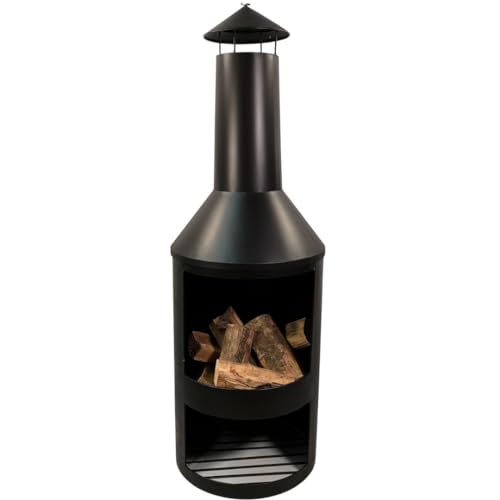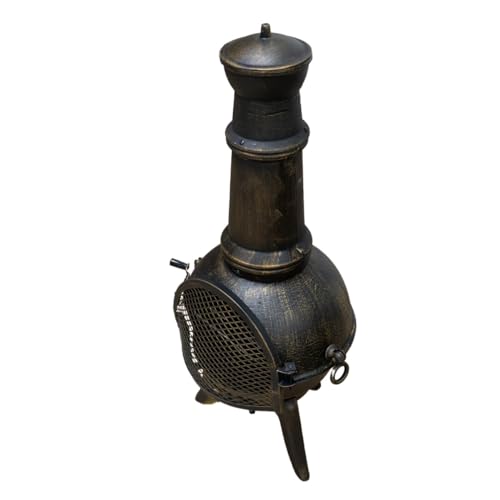10 Things That Your Family Teach You About Chiminea Large
페이지 정보
작성자 Deloras 작성일24-11-08 07:29 조회9회 댓글0건관련링크
본문
 Clay Chiminea extra large chiminea
Clay Chiminea extra large chimineaChimineas made of clay are a great way to enjoy a fire in the outdoor fire. They are a bit more fragile than iron chimineas, and need particular attention to ensure that they last a long time.
Fill the chiminea up with sand, about 3-4 inches below its mouth. This will protect the chiminea for the first few times from flame contact and allow it to season.
Material
Chimineas made of clay have been used for about four hundred years to gather for conversation and food, and to warm the home. They are generally constructed from terracotta clay although they are also available in a variety of materials, including cast iron and steel.
Cast iron is more durable and less susceptible to damage caused by sudden temperature changes than terracotta. However, it could crack or break easily if it is not shielded from rain and snow. Terracotta is more fragile but gives the chiminea a traditional Mexican appearance.
It is essential to let your clay cure chiminea for the garden prior to using it for the first time. This will stop it from cracking due the sudden temperature change of the fire. This is done by placing about two to three inches of river sand in the bottom of the chiminea. Then, begin with small pieces of kindling and gradually increase the size of the wood you choose to use. After a few brief flames, the clay should be ready to use.
Chimineas made of clay can be sealed to prevent moisture from destroying the chimneys over time. This is ideal for any fire pit outdoors. But it is essential for chimineas sale made of clay, as the clay absorbs moisture and can be damaged if exposed too much.
Although a chiminea made of clay is less likely to break than metal, it will require some care to prevent water damage. Chimineas made of clay should be covered when not in use and they should never be stored in a closed space because repeated exposure to moisture can cause the clay to break or crack.
Since they weigh more than other kinds of chimineas, clay ones need to be placed in a solid base designed to accommodate outdoor fire pits. A patio hearth is a great option to accomplish this, since it creates a fire-safe zone on a wooden deck or patio. The hearth for a patio can be built with bricks or pavers and should be at least a three-by-four-foot area. If you don't want to build a patio hearth you can put the chiminea in an even patch of garden soil, however this isn't recommended because it could cause cracks or breakage to the chiminea with time.
Size
Chimineas are becoming increasingly popular. They create a peaceful atmosphere outdoors, but also generate heat. This makes them perfect for cooking or simply enjoying the company of your loved ones. They can be found in a variety of styles and sizes, ranging from traditional clay models to contemporary cast iron and stainless steel versions. They are among the most versatile garden items available. They can be employed in a variety ways, including for cooking, heating, and for decoration.
Chimineas are incredibly fragile and susceptible to cracking due to the fact that they need to endure changes in humidity and temperature, therefore it is crucial to look after them properly. A cover will protect them against rain damage which could cause them to weaken over time and crack. It is also a great idea to put some Gardeco lava stone or 50mm of sand at bottom of your chimenea. This will shield it from direct heat and stop the hottest part directly touching the clay which can cause it crack.
A cap made of clay is beneficial as it will stop water seepage that could result in them weakening over time and crack. The chimeneas that are capped with clay are more expensive than the ones that aren't capped, but it is worth the investment because it will prolong their lifespan. Keep them away from flammable items since this could cause an accident. Also, do not put them in areas that are windy because this could cause the smoke to flow in unexpected directions and make it difficult to use.
It is an excellent idea to seal your chimenea by using Butchers' wax or Future floor wax once or twice per year. This will shield the clay from the elements and make it more resistant to cracking and warping. If you have any concerns about how to properly care for your chimenea or if you need help with anything else you're looking for, don't hesitate to contact us. We'll be more than happy to assist.
Cooking
Chimineas are designed to be used outdoors for cooking, and a large range of options are available. They are typically made of clay but can be made of cast iron or aluminium. They can be powered by wood, charcoal or gas. Many models are equipped with built-in grates, making them ideal for preparing outdoor meals.
Be aware of the material, size and design when selecting the chiminea bbq and chiminea (read more on www.sitiosecuador.com`s official blog) that is the most suitable one for your needs. A traditional clay chiminea provides an elegant appearance and excellent heat distribution, while aluminum and cast iron are more durable and adaptable. Certain chimineas have additional features like side tables for food preparation, allowing you to turn your fire into a center of culinary activity.
Once you've found the perfect location for your chiminea, put it up on a level area of concrete, brick or stone patio. It is important not to set it on a wooden deck as sparks could escape from the chimney and ignite any flammable material beneath it. It's not recommended to place the chimney close to eaves or other structures overhead since they could catch fire.
The bowl of your clay chiminea up to approximately 3 inches below the mouth. This will help keep the hottest part of the flames from the clay and stop it from cracking. Next, create small flames of firewood and paper, then let it go to a halt and burn out naturally.
Let your chiminea cool down completely after the fire has been put out before moving it or adding fuel. This will help minimize excessive smoke, reduce the chance of fires in chimneys and improve your outdoor cooking experience. As ash and debris could clog up the chimney, it is essential to regularly clean the chiminea. Make sure to remove any ash and debris after every use, as as during cooling, to avoid damage. Keeping your chiminea clean and secured will prolong its lifespan and ensure that it operates to its best.
Maintenance
The key to keeping your Clay Chiminea looking good and working safely is regular cleaning, safety measures, and a clear set of guidelines for use. These simple steps will make your chiminea last longer and ensure safe, enjoyable fires all year long.
Chimineas are made for small fires. It is important to start with kindling and small logs, and then gradually increase the size of the fire over a few use. This allows the clay to cool slowly, reducing the chance of thermal shocks that could cause cracks in the clay.
It is advisable to use an air-tight cover for your chiminea whenever it's not in use in wet weather or during the night. A cover can reduce the amount of moisture and rain which can cause damage to the chiminea over the course of time. A cover that is breathable allows ventilation, which prevents condensation from accumulating and causing damage to the chiminea.
Properly removing the chiminea from its flames is essential to ensure its longevity. Avoid using accelerants such as gasoline, coal, briquettes or propane, which can cause damage to the chiminea and create danger to your safety by releasing toxic fumes. Extinguish the chiminea with sand or an extinguisher made of chemical to put out the flames.
Keep your chiminea clear of branches and wires that hang over the edge, wooden fences, and garden furniture. Additionally, it's a good idea to stand the chiminea on a non-flammable area, like the patio of a stone or tile.
It is essential to examine your chiminea frequently for cracks and damage. This is particularly important after heavy use or in extreme weather conditions. Repair any damage quickly using a clay-based repair kit. This will prevent the cracks from advancing and damaging your chiminea.
 A chiminea is a great focal feature for your outdoor space. It brings warmth and charm, and can be positioned in any garden or patio. With regular maintenance and proper care, your chiminea will be a beautiful part of your home for a long time to be. Follow these simple guidelines and your chiminea will last longer and be safer to use than ever.
A chiminea is a great focal feature for your outdoor space. It brings warmth and charm, and can be positioned in any garden or patio. With regular maintenance and proper care, your chiminea will be a beautiful part of your home for a long time to be. Follow these simple guidelines and your chiminea will last longer and be safer to use than ever.댓글목록
등록된 댓글이 없습니다.


